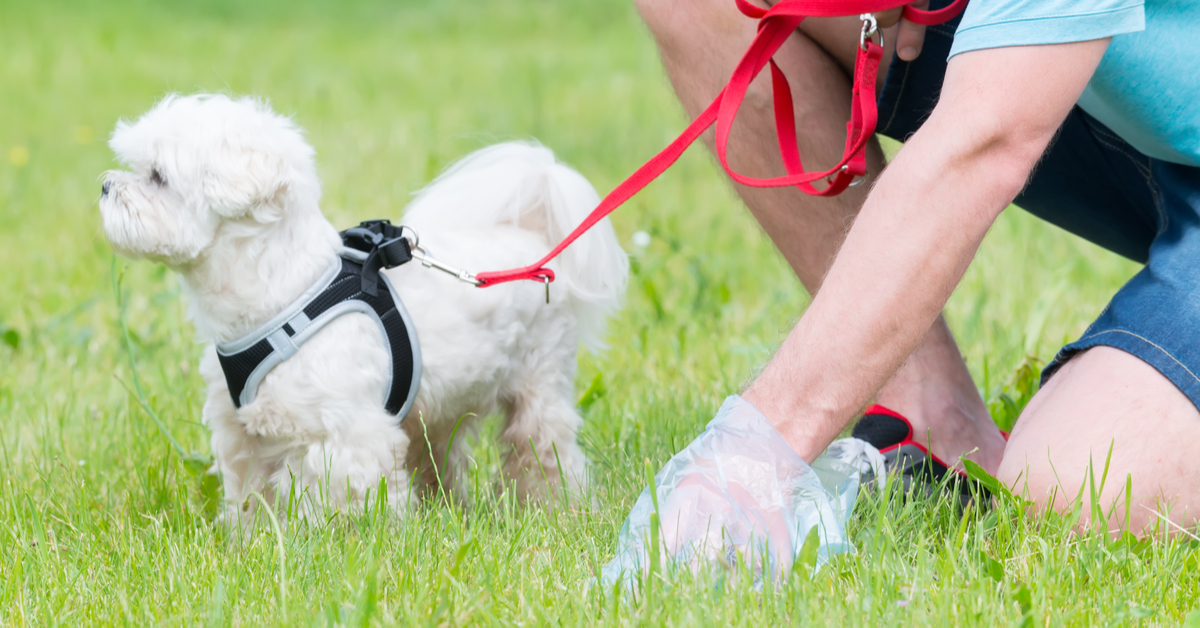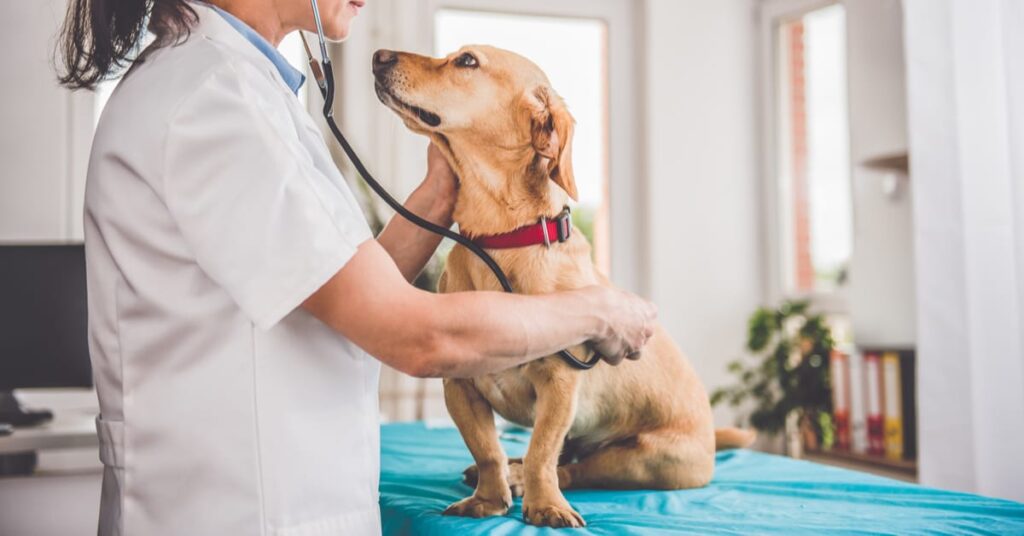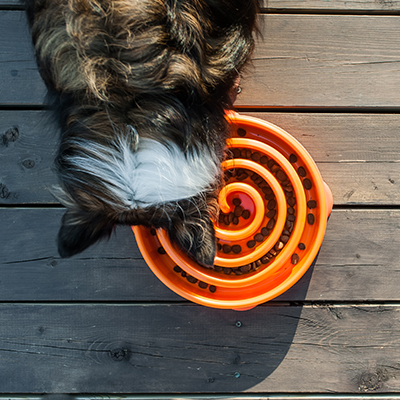Every pooch has a little diarrhea every now and again. Who doesn’t? Often, it’s no big deal, but sometimes it’s an indicator of something far more serious. That could mean anything from just an upset stomach to cancer.
So how can a loving pet parent know when a bout of diarrhea is nothing to worry about or a life-threatening emergency? Let’s take a look at the scoop on your dog’s poop!
What are Common Causes of Diarrhea?

There are a number of different causes of diarrhea. At the heart of what’s happening is that the normal movement of the gastrointestinal tract, known as peristalsis, has become too rapid because it’s trying to get something out of the body quickly. It’s really one of the body’s defense mechanisms.
It results in diarrhea which can be mild or severe, but even mild bouts of diarrhea can become a problem if the problem goes on for too long. Let’s explore a little more.
Mild Cases of Diarrhea

Mild cases of diarrhea may not seem like they require a trip to the vet, but they can pose a serious threat to pet health. Even if it is something that can be treated relatively easily, ignoring the problem can result in a life-threatening situation.
It is common for your pet to get mild diarrhea every now and again. This is often a reaction by your dog’s body to something it wants to get rid of fast. For example, perhaps your pup got into the garbage and ate something his system is not used to, or that was spoiled.
Perhaps you changed his dog food or treats, and that has caused diarrhea. That kind of diarrhea will often pass (pun intended), but if it lasts for too long, it can become a problem. Chronic diarrhea, even if it’s mild, can cause dehydration, and that can become a serious health issue in and of itself.
Pancreatitis
Additionally, sometimes eating something he’s not used to can give your dog a case of pancreatitis. In addition to producing insulin, the pancreas also produces certain digestive enzymes.
When your dog gets into the garbage or eats too many table scraps at Thanksgiving, for example, the pancreas can become inflamed, resulting in diarrhea and vomiting. This situation will often require a trip to the emergency vet.
Intestinal parasites
Another common reason for bouts of diarrhea is intestinal parasites. Dogs are susceptible to several common parasites, including roundworms, giardia, whipworms, coccidia, and hookworms. All of these can cause loose bowel movements.
To diagnose intestinal parasites so you can treat them, you’ll need to take a sample of your dog’s stool to your veterinarian for analysis. They can figure out which one your dog has and give you medication to get rid of them. It’s important to get them treated because a large parasite infestation can threaten a puppy’s life, and it can compromise an adult dog’s immune system.
Stress & Anxiety
Another common cause of diarrhea is stress or anxiety. When your dog is stressed, it activates what is known as his fight or flight nervous system, the job of which is to prepare your dog for either fighting or fleeing a threat. Part of that preparation can be the evacuation of the gastrointestinal tract resulting in diarrhea.
Medication
It’s also possible that certain medications can cause diarrhea as a side effect, and this may be the problem. Again, even if this is mild in its expression, if it goes on for too long, you may need to contact your veterinarian to change the medication or diagnose the cause of the problem.
Serious Cases of Diarrhea

Other conditions that can cause diarrhea may indicate a more serious problem. It’s easy for dogs, particularly puppies, to ingest foreign objects. You know, they eat your couch, so they’re ingesting fabric and other items that are not normally on the menu.
They can also swallow toys or bones, and these can irritate their gastrointestinal tract or even cause a blockage in their intestines. If that happens, that’s a big problem that may require emergency veterinary care, including surgery.
Other serious health issues can lead to mild intestinal distress or more severe diarrhea. It’s always possible your dog has ingested some kind of toxin or poison, or he may have gotten ahold of something in the house, like human medications or certain plants, that are toxic for dogs. If you suspect this is the case, it is an emergency, and you’ll need to get to the animal hospital immediately.
There are also some other underlying causes of diarrhea that represent a serious threat to your dog’s health. These include:
- viral infections like parvovirus or even coronavirus
- bacterial infections like salmonella
- diseases like inflammatory bowel disease, colitis, liver or kidney disease
- intestinal cancer
These life-threatening diseases can cause chronic diarrhea, and they might also cause sporadic episodes of diarrhea. They are usually accompanied by other symptoms like weight loss. They will likely require more extensive veterinary attention that would include bloodwork, radiographs, and other types of diagnostic tests.
When Is Dog Diarrhea an Emergency? How to Tell If Your Pooch Needs Veterinary Attention.

The devil’s in the details, as they like to say. There are several things to consider if your dog is having bouts of diarrhea. For example, if he’s acting normal otherwise and diarrhea passes quickly, it’s likely nothing to be too concerned about.
You might mention it the next time you see your veterinarian. You might also take a sample of your dog’s stool for them to check for parasites. A good rule of thumb is that if your canine companion has two or more bouts of diarrhea, it warrants a visit to the vet.
Several recurring bouts of diarrhea, particularly if they happen over a short period of time, could be a sign of a serious health problem. This is certainly true if your pooch is elderly, very young, or if he has a compromised immune system.
Another symptom to look for is straining. One of the causes of dog diarrhea is the possibility that he ingested a foreign object. If your dog appears to be straining when he’s having a bowel movement, that could indicate a blockage somewhere in his digestive tract.
Other symptoms to look out for include hemorrhagic diarrhea (which simply means bloody diarrhea), vomiting, weakness, loss of appetite, and unusual drooling. Hemorrhagic diarrhea is one of the symptoms of parvovirus, which can also cause vomiting.
Unusually drooling and weakness could indicate exposure to a toxic substance, and loss of appetite is associated with many different underlying serious health issues. If you see these symptoms alone or in combination, it warrants a visit to the animal hospital.
What Can You Do to Soothe Your Dog’s Digestive Tract?

If you determine that your dog’s diarrhea is mild or due to something that is easily treated, make sure you don’t make it worse by giving him food that will upset his digestive tract. It’s best to give him a bland diet, like lamb and white rice, that his system can easily digest.
You might also want to include probiotics, such as might be found in Greek yogurt, to help reestablish normal flora in the gut. This is particularly true if the cause of the diarrhea was a course of antibiotics.
Antibiotics can also wipe out the normal bacteria in your dog’s intestinal tract. Even though they are necessary to treat bacterial infections, they don’t discriminate, so you’ll need to help him get his gastrointestinal system back to normal.
Final Thoughts
Doggy diarrhea can quickly get the whole family down in the dumps (I couldn’t resist). More than that, it can become a big problem, fast. It might just be a temporary situation that passes quickly, but if not, it’s time for a trip to the vet.
Recurring bouts of diarrhea, bloody stools, diarrhea following ingestion of toxins, and diarrhea that is accompanied by other symptoms are all signs that it’s an emergency. As a loving pet parent, you don’t want to wait until it becomes a life-threatening situation.

